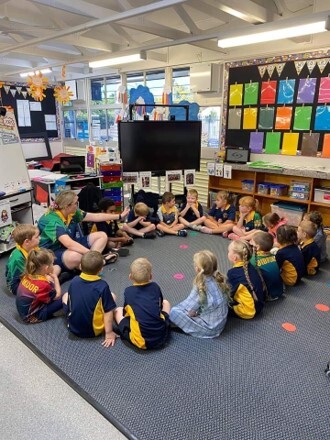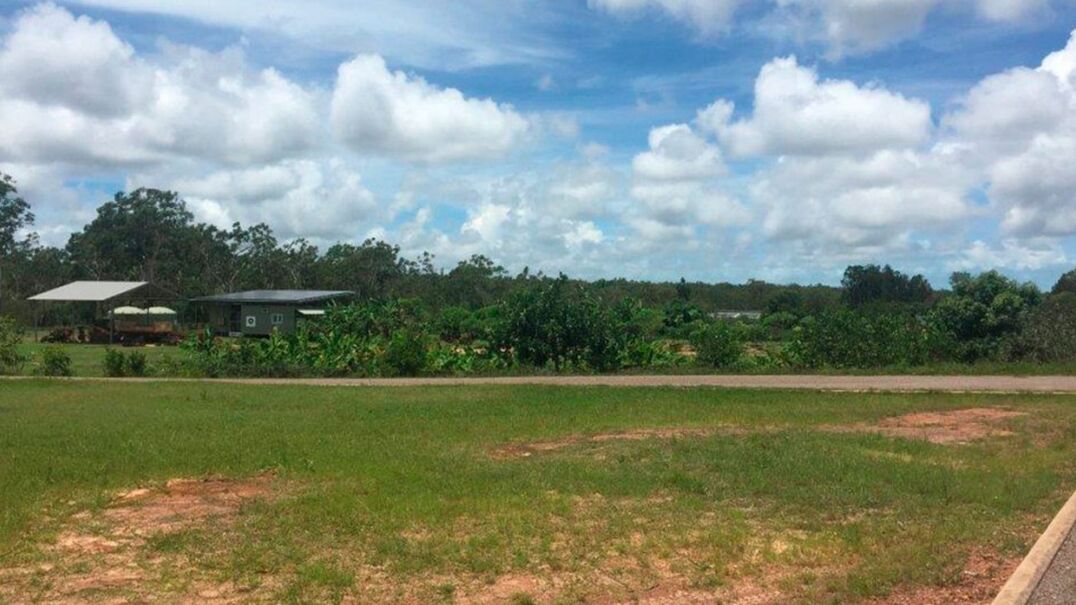Kelso State School is a primary school situated on Gurrumbilbarra, the traditional lands of the Wulgurukaba and Bindal peoples, also known as Townsville, North Queensland. The school serves a diverse, multicultural community. Of its students, 40% are Indigenous and 23.3% have a disability.
In 2018, Principal Darrell Sard, Key Educator Positive Behaviour for Learning (PBL) Kim Fox, and their leadership team began investigating trauma-informed pedagogical approaches to meet the diverse teaching and learning needs of their students and wider community.
A snapshot of the school in 2023
- 345 students (Foundation to Year 6)
- leadership team comprising Principal, Deputy Principal, Head of Inclusion, Head of Department Curriculum, Key Educator PBL and Early Years Coach
- school based support staff including Guidance Officer, Social Worker, QPS-School Support Officer, Occupational Therapist, Speech Language Pathologist, Community Hub Coordinator, Community Hub Assistant
- 22 classroom, specialist and inclusion teaching staff
- 12 teacher aides
- 11 administration, grounds and cleaning staff.
BSEM thanks Darrell, Kim, and their team for sharing their school’s story of impact with their community. Their own words are showcased below.
The impetus for change
In 2018, we (Principal Sard and the leadership team) began investigating trauma-informed pedagogical approaches to meet the diverse needs of our students and wider community. Various wellbeing and engagement frameworks were considered, and a visit to Doveton College (a Prep to Year 9 school in Melbourne) showed us that the Berry Street Education Model’s trauma-informed wellbeing approach was the right one for our own context and our students and families.
Our PBL team headed off to Brisbane in early 2019 to take part in the first 2 days of training. The team was tasked with the challenge of determining the steps for aligning Berry Street pedagogies within our PBL and Wellbeing frameworks.
Returning with passion and ideas, the team’s plans were put on hold when Townsville went through a catastrophic flood event. Many families, and the school itself, were impacted by this once-in-100-years event. For the school, mould and leaks damaged resources and learning spaces. For some of our staff and families the losses were much greater, including homes and all belongings.
This experience further embedded the importance of directly addressing community stressors through the Berry Street Educational Model and how the model can be used to engage and support students, families and the community.
By the end of 2019, most Kelso State School staff had completed the 4 day training, with a commitment from the school leadership team to train new staff each year.
Getting started with the Berry Street Education Model

The PBL team started by determining the key pedagogical strategies that would be used in every classroom, every day – embracing the mantra consistent, predictable routines.
Our own BSEM ‘non-negotiables’ in the first year (2020) included:
- morning greetings which included healthy physical contact (such as high fives and handshakes) and non-contact greetings (like a wave or nod) with each student’s name. These transformed during COVID to safe, socially-distanced practices but remained a key strategy
- Ready to Learn Scale check-ins
- morning circle with a Positive Primer, celebrations and daily schedule
- Brain Breaks at regular intervals
- mindfulness
- check out circle.
The success of the above strategies encouraged us to continue, and in 2021 we:
- added a designated calm corner in every classroom, with sensory tools. Expectations and routines for this space were co-designed with staff and students
- invested in Berry Street Staff Diaries and weekly BSEM lessons to explicitly teach BSEM learning and strategies to all students
- continued to set future goals each term.
We also undertook a review of our own Student Code of Conduct. Within the scope of this document, we moved to a restorative justice view of student management to ensure that relationships were repaired and maintained and that students were supported to regulate and to undo harm that may have been caused. This included changing some of our mindsets and, as a result, the language we used as a school community. Rewards became recognitions, consequences became restitutions and time outs become resets. Students, parents and community members were given opportunities to provide feedback in the development of this document. Students were given a voice in this process, and they expressed being heard and included.
In 2022 our Key Educator PBL, Kim Fox, took part in the BSEM Masterclass program, and refocussed the beginning of the 2023 school year to ensure the Body domain was front and centre of all that we do in the school. This enabled the re-teaching of regulation strategies and supporting pedagogies to work with students, including those who were experiencing escalation or displaying adverse behaviours. Our staff were able to revisit these regulation techniques and Ready to Learn plans.
The biggest change has been the shift in mindset, understanding that you have to regulate before you educate, and seeing each child as an individual who comes with different attachment, regulation and personal/social skills that need explicit teaching and support to meet unmet or still developing needs.

The benefits of BSEM to the school community
The implementation of the Berry Street Education Model has led to significant changes in mindset, pedagogical approach and relationship development across the school and wider community.
The impacts on student behaviour are measurable. For example, deliberately using the relational approach of the BSEM strategies helped the restructuring of our grades 5/6 composite classes. This allowed students to be placed with teachers who had, or could develop, strong relationships with each student, and with peers who would support each other regardless of cognitive, social-emotional or financial differences. In 2021, this cohort contended with high levels of recorded adverse behaviours. However, the following year in 2022, our data showed that by using clear and consistent BSEM routines, the cohort saw a drop of up to 82% in recorded adverse behaviours.
Alongside this, our staff now feel confident to embed trauma-informed practices and to assist students to regulate. New staff are supported by our Key Educator PBL to develop their knowledge of BSEM pedagogies prior to attending BSEM training. Our ‘non-negotiables’ are now standard practice and embedded in our daily school routines. Students are quick to point out when circle time, mindfulness or brain breaks are skipped in a day, and deliberate supports are left for relief teachers to ensure consistency of routine. This consistency has led to a calmer, happier school environment.
BSEM supports the engagement and wellbeing of my Indigenous students and their families. It provides pedagogical strategies that support the complex trauma of our Indigenous community both at present and intergenerationally. Supporting our little fellas’ bodies and building strong positive relationships is the heart of my culture and fittingly the first two domains in the Berry Street Education Model.
The community feedback is that they love the school, our inclusivity and deliberate student-centred focus, which shows families that each student will receive what they need to be successful.
Whilst this journey hasn’t been without hurdles and challenges, the value of our engagement with the Berry Street Educational Model is evident. This is now an embedded approach that we will continue to reflect on, adapt and strengthen to ensure the best outcomes for our students and community.
More about the Berry Street Education Model
Developed by teachers for teachers, the Berry Street Education Model (BSEM) provides educators with a toolkit of over 100 practical strategies for immediate use in the classroom and across your school.
BSEM shows educators how to build student engagement and support an improved capacity for school achievement by:
- understanding the benefits of trauma-informed teaching on child development and ability to learn
- creating a supportive and trauma-informed positive education classroom
- bolstering student-teacher relationships
- applying positive, relational classroom and behaviour management strategies
- instilling strengths-based practices across the school.



